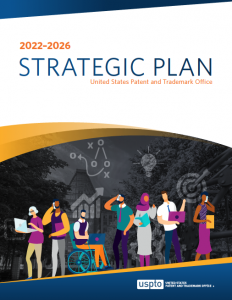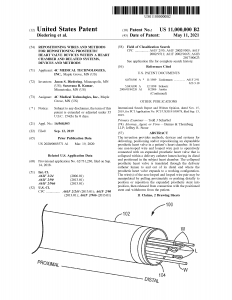
Doug Kim named to South Carolina 50 Most Influential list
Kim Lahey & Killough Firm Founder Doug Kim named to South Carolina 50 Most Influential list
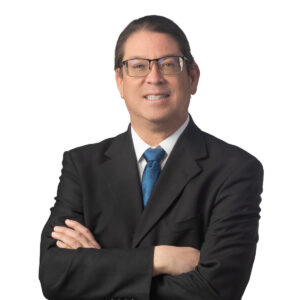 Kim Lahey & Killough is proud to announce that its firm founder, Doug Kim, has been named to Integrated Media Publishing’s inaugural list of the Statewide 50 Most Influential People in South Carolina. Honorees were chosen through extensive staff research by the publications group as well as community nominations for their work across the Palmetto State.
Kim Lahey & Killough is proud to announce that its firm founder, Doug Kim, has been named to Integrated Media Publishing’s inaugural list of the Statewide 50 Most Influential People in South Carolina. Honorees were chosen through extensive staff research by the publications group as well as community nominations for their work across the Palmetto State.
A former computer programmer and software engineer, intellectual property attorney Doug Kim has assisted in securing some of the earliest blockchain and AI patents in South Carolina. In addition to his own successful law practice, he has built a law firm that has grown to be South Carolina’s go-to boutique firm for intellectual property matters, providing legal solutions and strategies tailored to each client from start-ups to multinational corporations.
Doug is a leader in the state’s technology ecosystem, most recently serving as Chair of South Carolina’s InnoVision Awards. He is a frequent speaker and trusted authority on AI, technology and intellectual property matters throughout the state.
In addition to this recognition, Doug has previously been named to the South Carolina 500 list by SC Biz; the TALK Greenville Top Lawyers list in the area of Technology Virtual; he has been named by Best Lawyers® as Trademark Lawyer of The Year and Patent Lawyer of The Year for the Greenville metro market; Greenville Business Magazine has named him a Legal Elite of the Upstate; South Carolina Super Lawyers® lists him as a Top Rated Intellectual Property Attorney; and Managing Intellectual Property magazine has previously named him as an “IP Star.”
With offices in both Greenville and Charleston South Carolina, the Kim, Lahey & Killough Law Firm provides strategic legal solutions to businesses of all sizes in the areas of intellectual property creation and protection, brand protection, invention protection, copyright, licensing, intellectual property litigation, trade secrets, software protection, internet and e-commerce issues, corporate formation, contracts, and business disputes and mediation resolutions.
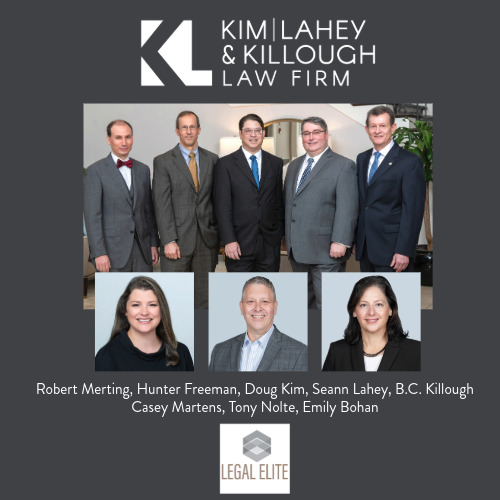
All attorneys listed as 2025 Legal Elite
Entire Kim, Lahey & Killough attorney team listed as 2025 Legal Elite by Charleston Business and Greenville Business Magazines
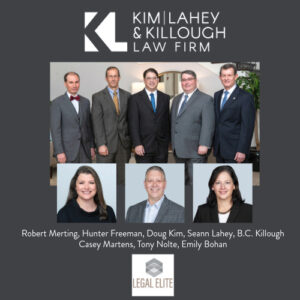 Kim, Lahey & Killough is proud to announce that each of their eight attorneys has been named in the 2025 Legal Elite lists with all five of the firm’s registered patent attorneys recognized as Legal Elite in Intellectual Property and Innovation by Greenville Business Magazine and Charleston Business Magazines. “There are only a select few firms in South Carolina that are boutique intellectual property firms and to have our entire team recognized by our peers in Legal Elite is quite an honor. This recognition confirms the commitment we have to our clients and to providing excellent legal services that help our clients create and protect their intellectual property. This reaffirms our continuing commitment to our clients to assist them with matching legal strategies with their business goals to grow their companies and innovations,” commented firm founder, Doug Kim.
Kim, Lahey & Killough is proud to announce that each of their eight attorneys has been named in the 2025 Legal Elite lists with all five of the firm’s registered patent attorneys recognized as Legal Elite in Intellectual Property and Innovation by Greenville Business Magazine and Charleston Business Magazines. “There are only a select few firms in South Carolina that are boutique intellectual property firms and to have our entire team recognized by our peers in Legal Elite is quite an honor. This recognition confirms the commitment we have to our clients and to providing excellent legal services that help our clients create and protect their intellectual property. This reaffirms our continuing commitment to our clients to assist them with matching legal strategies with their business goals to grow their companies and innovations,” commented firm founder, Doug Kim.
The IP attorneys named Legal Elite include firm founders Doug Kim and Seann Lahey as well as B.C. Killough, Hunter Freeman, and Robert Merting.
In addition to the firm’s core intellectual property practice, the firm supports businesses with corporate counsel. Business attorneys Casey Martens, Anthony Nolte and Emily Bohan were each recognized for their work in corporate matters: Casey was named for her work in Employment Law – Defendants and Emily Bohan was listed for Corporate Law – Business Organization matters.
Greenville business attorney Anthony Nolte rounds out Kim, Lahey & Killough’s whole team of Legal Elite, named for his work in Corporate Law-Merger & Acquisitions. Licensed in both South Carolina and Texas, Tony is a former business and financial executive as well as in-house counsel for Shell, among other successful ventures. He concentrates his legal work in the areas of company structure and formation, start-ups, early-stage and growth companies, corporate governance, mergers, divestitures, and acquisitions, financings, franchising & licensing, contracts, business succession, business disputes & resolutions. Outside of the office, Tony Nolte is an Angel Investor, teaches as an adjunct professor at Furman University, mentors startups in the Greenville ecosystem, serves as a limited partner in the Greenville Next Founders Fund I and is a member of VentureSouth.
The Legal Elite are selected annually through peer nominations from attorneys throughout the state of South Carolina in 50 legal practice areas.
About Kim, Lahey & Killough
With offices in Greenville and Charleston, SC and Brevard, NC, the Kim, Lahey & Killough Law Firm is devoted to helping clients establish, enforce, and leverage their intellectual property rights from the Upstate, to the Lowcountry to across the globe.
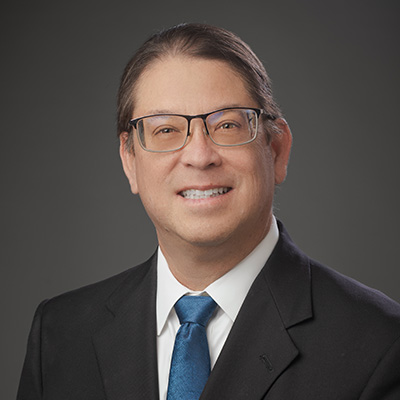
Key Business and Legal Trends in 2025
Navigating the Legal Landscape: Key Trends for Businesses in 2025
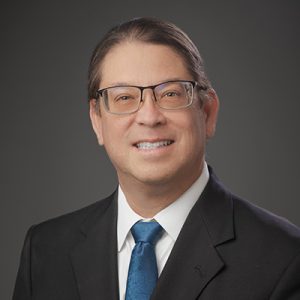 Kim, Lahey & Killough founding attorney Doug Kim joined Mike Switzer on South Carolina Public Radio’s South Carolina Business Review to discuss the new legal landscape for businesses in 2025. Key points include:
Kim, Lahey & Killough founding attorney Doug Kim joined Mike Switzer on South Carolina Public Radio’s South Carolina Business Review to discuss the new legal landscape for businesses in 2025. Key points include:
Disruptive Technology’s Impact
AI is rapidly reshaping business and the legal profession, presenting both opportunities and challenges. Unlike previous technological shifts, AI is accelerating change at an exponential rate, forcing businesses and law firms to adapt faster than before.
Key Implications for Businesses
-
Technology Adoption: Companies must be prepared to leverage new technologies quickly and strategically.
-
Increased M&A Activity: With substantial cash reserves and a pro-business climate, mergers and acquisitions are expected to increase.
-
Due Diligence Preparedness: Doug strongly advises businesses to begin due diligence preparations in anticipation of potential acquisitions.
In addition, the legal profession itself is experiencing significant disruption. AI tools are enhancing efficiency in research, particularly with regard to patent and trademark searches. Kim emphasizes that AI won’t replace lawyers, but lawyers and law firms that adopt AI technologies will likely outperform those that resist change.
In 2025, businesses must stay agile, embrace technology, and quickly manage the risks associated with new technologies and business models.
Listen to the full interview here or read the full transcript, below.

Full Transcript of The new legal landscape for businesses, an interview with Doug Kim on Mike Switzer’s South Carolina Business Review.
Broadcast on South Carolina Public Radio on January 23, 2025
[00:09.710] – Mike Switzer
Hello and welcome to the South Carolina Business Review. This is Mike Switzer.
As this New Year with a new administration in Washington just getting started, many businesses may be looking at the legal landscape and what they can expect to see in 2025. Doug Kim is an attorney in Greenville, South Carolina, where he joins us from now by phone to help us with this topic.
Doug, welcome to the program.
[00:39.990] – Doug Kim
How are you doing? Thanks for having me.
[00:41.620] – Mike Switzer
Great. Let’s just go ahead and kick off the discussion with an overview of what you see happening in the legal world this year.
[00:49.970] – Doug Kim
Well, it’s going to be quite a few fast changes, and I’ll give you my opinion of the analogies of why I think this is going to happen. And that is, Windows came out many years ago, and it made software accessible to the public in general, which was disruptive for society and business. 2007, the iPhone comes out and it creates software in your hand, again, disruptive for the benefit of increased technology – massive changes in business and society. What’s happening now is we have AI, which is even faster, that’s doing a couple of things. This is what’s driving changes in the legal side, I think. Ai has made everybody feel like, Oh, there’s this new technology. Gosh, we’re behind. We need to be stepping up. That’s one piece. Another piece is you’ve got a new administration who, by all accounts, seems to be reducing regulations and is going to be pro-business. Not that other administrations haven’t been, but this particular one seems to be more pro-business. Add on top of that, you’ve got a bunch of pent-up demand: during election years, businesses tend to, I don’t want to say stall, but they tend to not make much major decisions until they see what’s going on.
There’s a lot of money sitting on the guidelines to move projects forward. So, with all that said, you add the technology changes, the environmental changes, the geopolitical changes, and the fact there’s a lot of cash sitting out there, you’re going to watch the legal profession really have a lot of, quote, “pressures on it.” Our clients are going to be pressing us to be able to adopt technology and candidly, probably move faster than the legal profession is used to.
[02:22.290] – Mike Switzer
Okay. It sounds to me like a massive headache year for you.
[02:25.480] – Doug Kim
It could be based on the law firm’s attitude. It’s not uncommon for technology to change the law. For example, in one area of the law, the right to privacy. Well, everybody’s got a phone in their pocket now, and that phone has a camera. What is your expectation of privacy if everybody can video and photograph you now? So the way the law changed was because the technology changes. The law firms are just going to have to say, “All right, I need to understand this.” I need to step up and say, Here the deal is, as well as how these businesses are adopting it and say, “Okay, how do I manage the risk?”, which is a lot of what lawyers do with these new technologies and these new ways of doing business. And how do I keep myself up to speed so I can respond properly and competently to my client’s demands? I think when you say it could be a lot of headaches, it’s going to require lawyers to educate themselves in areas faster than maybe they’re accustomed.
[03:18.490] – Mike Switzer
Maybe giving up some of the bread and butter business that’s been the thing. In any way, you see a lot of consumers and businesses turning to alternative legal service providers like Legal Zoom.
[03:32.980] – Doug Kim
That’s exactly right. There is definitely a place for that. The legal services traditionally required a lawyer and a lawyer thinking to do some of this stuff. With the advent of some of these other businesses being in those areas, particularly with the leveraging of technology, it may not be a lawyer’s job, either 100% or maybe not even at all. I’ll give you a good example. The type of work that I principally do is intellectual property. We used to have to go hire people to do patent searches and trademark searches for us. Over the years, these patent and trademark databases have been developed by government agencies, Google patents, things like that. You can take the current technology with AI and do a patent or trademark search much more efficiently and faster than a human being could have done it years ago. Some of those tools that are out there are going to reduce, I don’t think eliminate…but reduce the need for some of the legal services that typically an attorney would do. Ai is not going to replace lawyers. It’s not going to do that. However, the law firms that adopt AI will probably replace the ones that don’t.
[04:35.080] – Mike Switzer
What is your recommendation for businesses that are listening right now then on what they should be doing to take advantage of these trends?
[04:41.730] – Doug Kim
If I had to say it in one sentence: Start thinking about getting ready for due diligence. You can Google due diligence and see what that takes. I mean, anybody can do that. If I’m right and there’s going to be an increased M&A activity and companies are going to be acquiring technology, not developing it, a company that wants to be a target for an acquisition would serve themselves well getting ready for this process.
[05:05.080] – Mike Switzer
All right, Doug. Great information. Thank you so much for spending time with us today.
[05:09.120] – Doug Kim
Happy to do it. Enjoyed it.
[05:10.870] – Mike Switzer
Doug Kim is an attorney. He joined us by phone from his office in Greenville, South Carolina. Remember, you can hear this show again at our web page, southcarolinapublicradio dot org. You can hear us again wherever you find podcasts with the South Carolina Business Review. This is Mike Switzer.
[05:33.700] – Announcer
The views expressed on the South Carolina Business Review do not necessarily reflect those of South Carolina Public Radio.
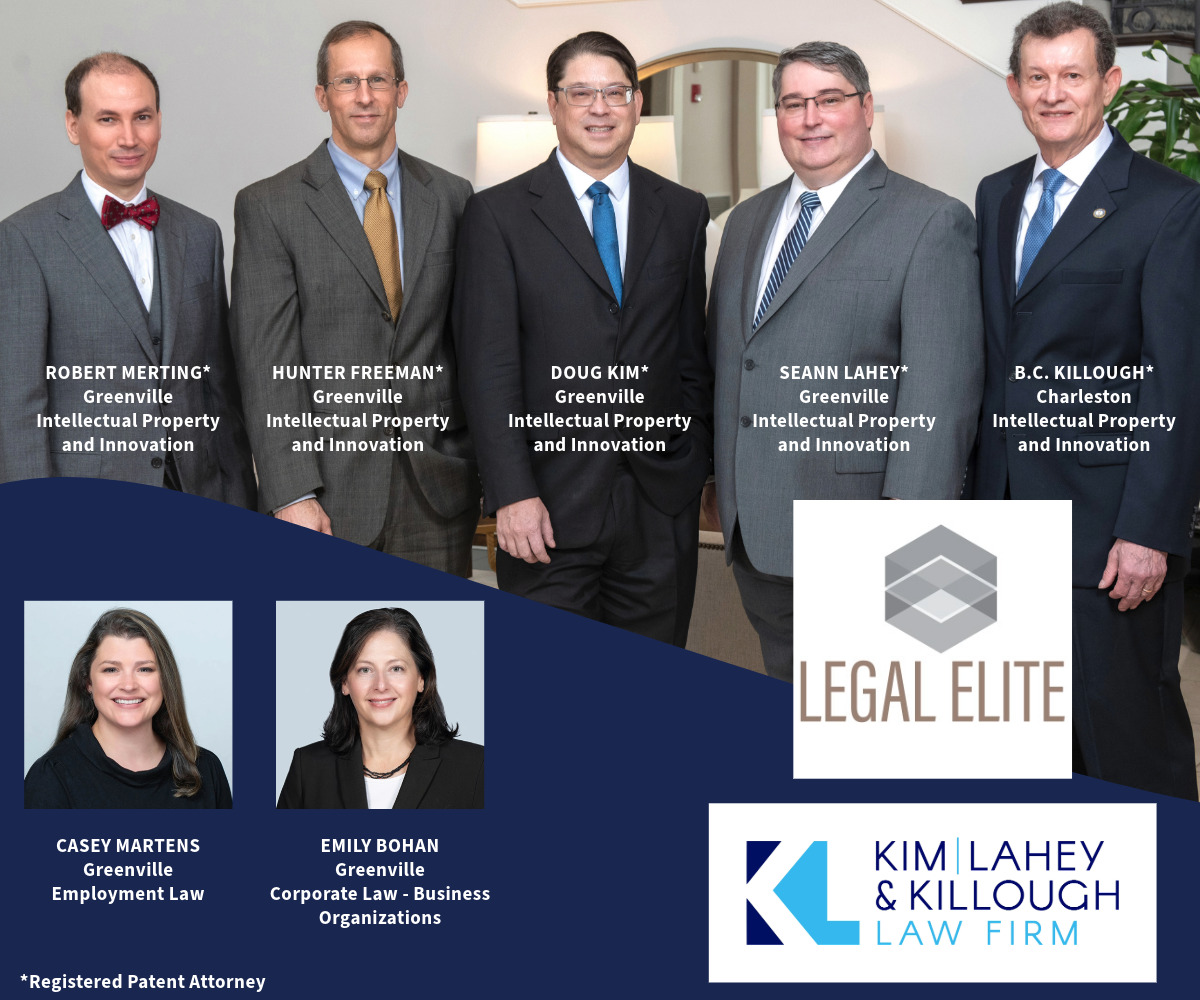
Seven attorneys named 2024 Legal Elite
Seven Kim, Lahey & Killough attorneys listed as 2024 Legal Elite by Charleston Business and Greenville Business Magazines
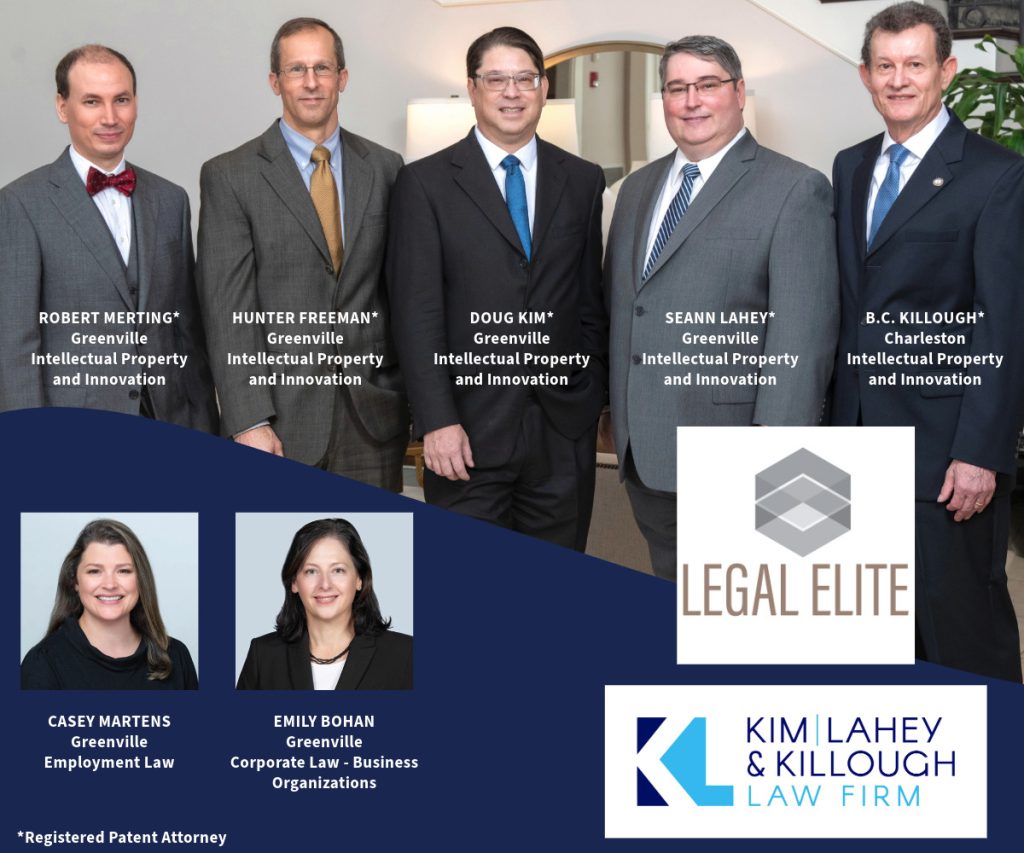
Kim, Lahey & Killough is pleased to announce that seven attorneys have been named in the 2024 Legal Elite lists. Notably, all five of the firm’s registered patent attorneys were recognized for their work in the areas of intellectual property and innovation, a core focus of the law firm.
Greenville Business Magazine and Charleston Business Magazine recognized Doug Kim, Seann Lahey, Hunter Freeman, Robert Merting and B.C. Killough for their contributions to Intellectual Property and Innovation. “This recognition from our peers is a testament to the depth and breadth of our IP practice, as well as our firm’s commitment to excellence. We are honored to have our entire patent team acknowledged, alongside our talented colleagues in employment and corporate law,” commented firm founder, Doug Kim. Additionally, Casey Martens and Emily Bohan were honored for their work in Employment Law and Corporate Law – Business Organization matters.
Doug Kim is no stranger to legal awards and accolades. In addition to his Legal Elite IP and Innovation recognition, Kim has been listed in South Carolina Super Lawyers annually since 2017, and he has been recognized in the Greenville, SC Best Lawyers® list, named the Best Lawyers® Trademark Lawyer of The Year, the Best Lawyers® Patent Lawyer of The Year, and an IP Star by Managing Intellectual Property magazine.
Firm co-founder Seann Lahey is noted for his IP and Innovation work not only by Legal Elite of the Upstate but is also listed in South Carolina Super Lawyers as well as Best Lawyers in America for his work in intellectual property law. Seann has extensive experience dealing with international and U.S. patent prosecution, trademarks, copyrights, trade secrets, licensing of intellectual property rights, and rendering legal opinions on validity, infringement and enforceability of intellectual property rights, as well as IP litigation.
Hunter Freeman has over 20 years of experience as a litigator and certified mediator and works to provide novel ways for clients to create value through the protection, prosecution and enforcement of their IP including trademarks, service marks and copyrights. As the 2024 Chairman of the InnoVision Awards, Hunter works hard to provide opportunities for start ups and businesses in the state to advance technological innovations. In addition to Legal Elite, Hunter has been recognized for his legal efforts by both Super Lawyers and The Best Lawyers in America ® for his work in intellectual property and business litigation.
Greenville patent attorney Robert Merting joins his colleagues as a named Legal Elite for IP and Innovation this year. Robert’s general business practice serves a variety of clients and industries, including builders, manufacturers, inventors, professionals and governmental organizations. He counsels businesses and individuals on IP contracts, corporate IP agreements, trademarks, non-disclosure agreements, and patents.
Charleston patent attorney B.C. Killough has counseled businesses and professionals for over 30 years. Regularly recognized for his legal efforts on behalf of his clients, Killough’s Legal Elite for IP and Innovation award is joined by recognition as a Senior Fellow by the Litigation Counsel of America, as an AV preeminent rated attorney with Martindale-Hubbell, as a Best Lawyers Corporate Lawyer of the Year for the Charleston market, and Thomson Reuters has recognized Killough as a Stand-Out Lawyer – a recognition bestowed by in-house counsel peers.
Casey Martens is recognized as a Legal Elite for her work in employment law for both plaintiffs and defendants. Casey’s legal practice includes business litigation, intellectual property and employment counsel to small and medium-sized businesses, as well as to employees in employment disputes. Licensed to practice in South Carolina, North Carolina and Georgia, Casey heads up the firm’s Brevard, NC office.
Business attorney Emily Bohan is commended as a Legal Elite for her efforts with Corporate Law – Business Organization matters. Emily focuses her legal practice on franchise law, business formation and organizations (Including LLC’s and Partnerships), and labor and employment matters. And when businesses are in a dispute, Emily serves as a certified mediator, to assist parties to come to a resolution outside of the courtroom. Greenville Business Magazine recognized Emily as a 2024 SC Women in Business.
The Legal Elite are selected annually through peer nominations from attorneys throughout the state of South Carolina in 50 legal practice areas.
About Kim, Lahey & Killough
With offices in Greenville and Charleston, SC and Brevard, NC, the Kim, Lahey & Killough Law Firm is devoted to helping clients establish, enforce, and leverage their intellectual property rights from the Upstate, to the Lowcountry to across the globe.
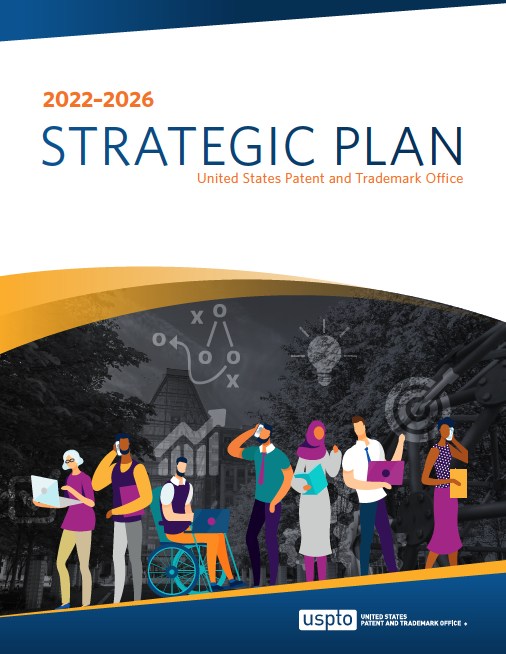
U.S. Patent and Trademark Office releases 2022-2026 Strategic Plan
Plan sets priorities that enable the agency’s new mission and vision
WASHINGTON, DC (June 7, 2023) — The U.S. Patent and Trademark Office (USPTO) today published its 2022-2026 Strategic Plan, completing a planning process that welcomed more than 150 comments on the draft version from the public and USPTO employees.
“We are reimagining the USPTO of the future, an agency that issues, upholds, and protects robust and reliable IP rights that incentivize innovation and bring more ideas to market for and from all,” said Under Secretary of Commerce for Intellectual Property and USPTO Director Kathi Vidal. “Our 2022-2026 Strategic Plan is our path forward for continued success – we thank everyone who provided feedback throughout the planning process to make this plan ambitious, focused, and relevant.”
The new plan outlines the USPTO’s mission-focused strategic goals:
1. Drive inclusive U.S. innovation and global competitiveness;
2. Promote the efficient delivery of reliable intellectual property (IP) rights;
3. Promote the protection of IP against new and persistent threats;
4. Bring innovation to impact for the public good; and
5. Generate impactful employee and customer experiences by maximizing agency operations.
The plan directly supports the USPTO’s new mission of driving U.S. innovation, inclusive capitalism, and global competitiveness, and its new vision of unleashing America’s potential, with multiple objectives directly linked to each of these five goals.
For more information on the USPTO 2022-2026 Strategic Plan, visit www.uspto.gov/StrategicPlan.
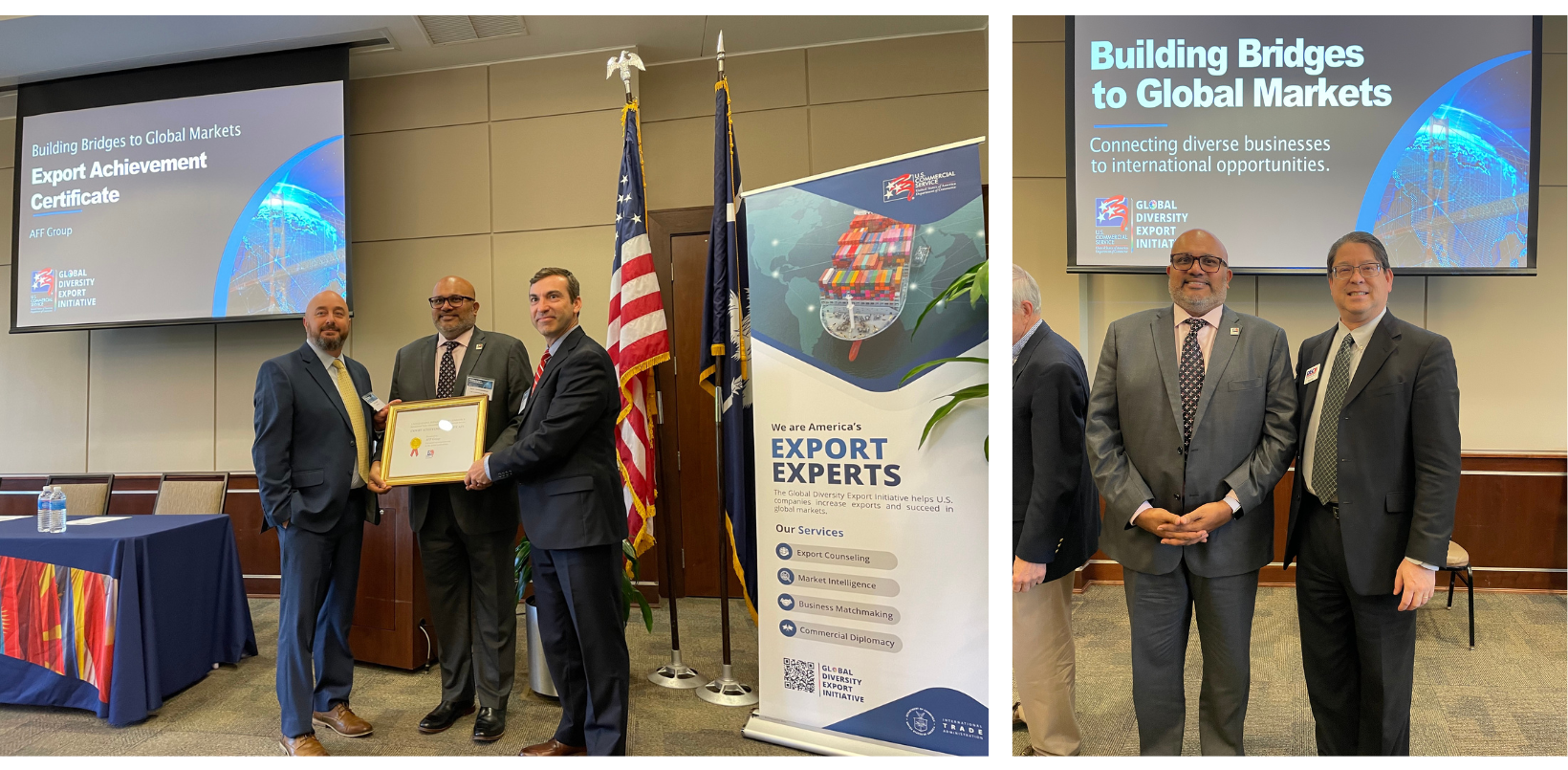
AFF Group Honored with Export Achievement Award
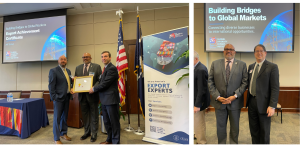 The Kim, Lahey & Killough Law Firm congratulates the AFF Group, formerly known as the American Foam & Fabric Company, for being honored with the Export Achievement Award from the U.S. Department of Commerce. This prestigious award recognizes the outstanding achievements of U.S. companies in the international market and their contributions to expanding U.S. exports.
The Kim, Lahey & Killough Law Firm congratulates the AFF Group, formerly known as the American Foam & Fabric Company, for being honored with the Export Achievement Award from the U.S. Department of Commerce. This prestigious award recognizes the outstanding achievements of U.S. companies in the international market and their contributions to expanding U.S. exports.
The announcement was made in April during the International Trade Administration U.S. Commercial Service’s Building Bridges to Global Markets event in Greer, SC. This regional event included included the South Carolina District Export Council and special guest Arun Venkataraman, who is the Assistant Secretary of Commerce for Global Markets, and Director General of the U.S. and Foreign Commercial Service.
Kim Lahey & Killough’s founding attorney Doug Kim serves on the SC District Export Council. He remarked, “It’s a pleasure to see clients recognized for their success. This well-deserved recognition is a testament to AFF’s efforts to expand their market and business reach internationally.”
The AFF Group has been a leading provider of high-quality foam and fabric products for over 60 years. The company operates several manufacturing facilities in the United States, including its headquarters in Lyman. Over the years, the company has developed a reputation for excellence in product quality and customer service.
In recent years, AFF Group has expanded its business into international markets, exporting its products to countries all over the world. The company’s success in the international market is a testament to its commitment to innovation, quality, and customer satisfaction.
AFF Group CEO Ben Leinster commented, “We are incredibly honored to be recognized by the U.S. Department of Commerce for the Export Achievement Award. Whether deciding which foreign markets to pursue or coordinating logistics of a trip, we are grateful for the assistance of the partnership with the U.S. Department of Commerce and the SC District Export Council.”
In addition to AFF, Greenville-based IT company Blue Eye Soft was also recognized with an Export Achievement Award. The U.S. Department of Commerce’s International Trade Administration (ITA) presents the Export Achievement Award to companies that have demonstrated a commitment to exporting and increasing their international sales. The award recognizes companies that have shown exceptional progress in expanding their exports or penetrating new markets.
The ITA plays an important role in promoting U.S. exports and supporting U.S. companies in the international market. The agency works with U.S. businesses to identify new export opportunities, provide market intelligence, and develop export strategies. The ITA also provides technical assistance and funding to help companies expand their international sales.
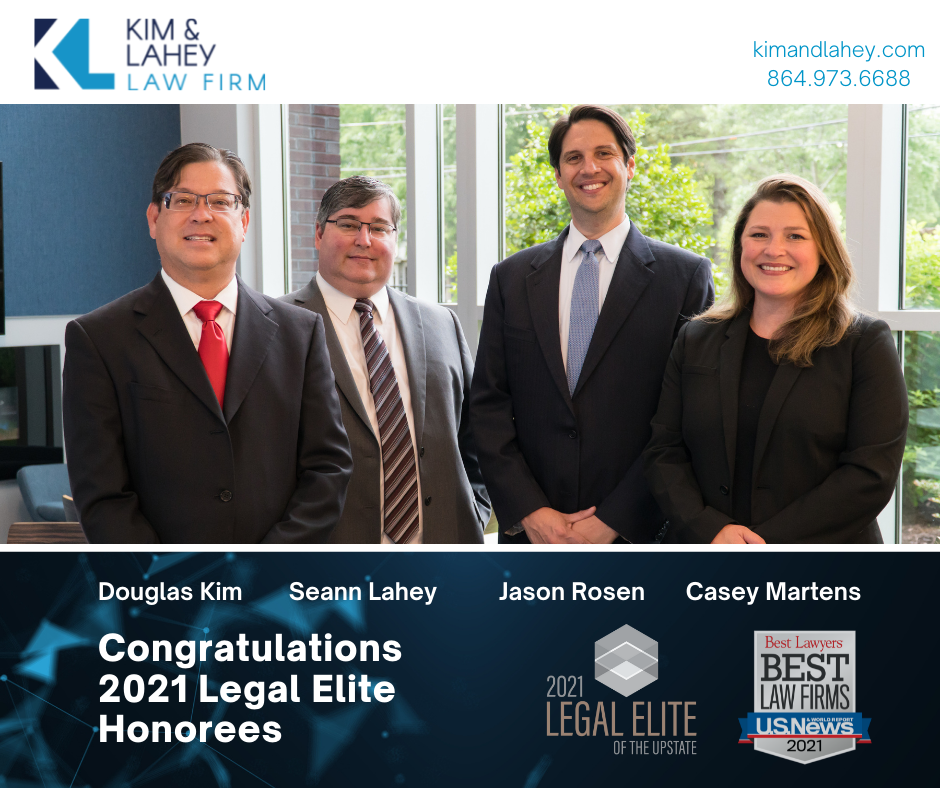
Kim & Lahey Attorneys Honored in 2021 Legal Elite
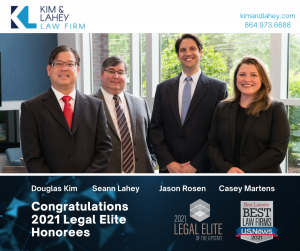
The Kim & Lahey Law Firm is proud to announce that our attorneys are being honored by Greenville Business Magazine as part of South Carolina’s 2021 Legal Elite. This is the second year in a row that all Kim & Lahey attorneys have made the list.
Greenville Business Magazine’s Legal Elite is the only regional awards program that allows every active attorney to nominate and vote for their peers across 26 categories. The following are the Kim & Lahey attorneys selected for inclusion, as well as the practice areas in which their work is recognized:
Douglas Kim: Intellectual Property and Innovation – Business Litigation
Seann Lahey: Intellectual Property and Innovation – Business Litigation
Jason Rosen: Tax and Estate Planning – Corporate Law, Mergers, and Acquisitions
Casey Martens: Labor and Employment
Thank you to all of our peers who voted and congratulations to all of the South Carolina attorneys who are being recognized this year.
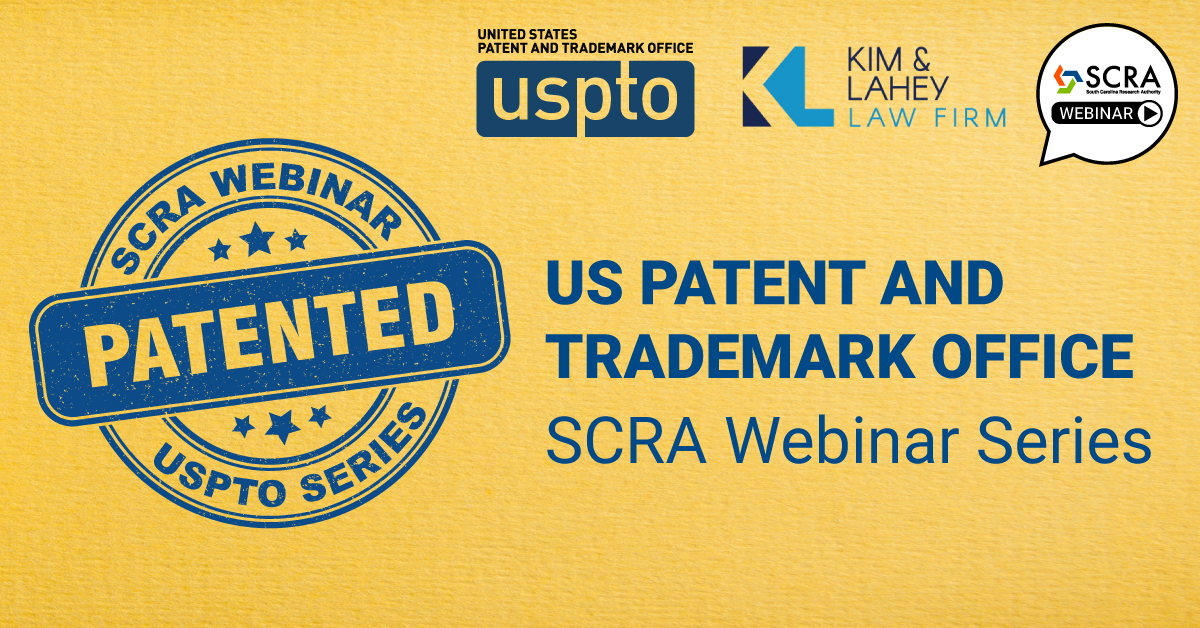
Join Us: Special Webinar Series featuring the U.S. Patent Office!
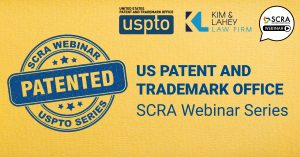
Hear from national experts during this five-part webinar series. You will learn everything from the basics of intellectual property, including trademarks, patents and copyrights, to how to protect your inventions using the claims process. Session titles include: The Path to a Patent, IP basics, patent searching, drafting a patent application, and drafting patent claims.
The Path to a Patent, Part I: IP Basics
June 8, Presenter: Elizabeth Dougherty, USPTO
Elizabeth discussed intellectual property basics during this interactive virtual session. In this module, she provided a brief overview of the different types of IP (patents, trademarks, trade secrets, and copyrights). She reviewed the patenting process from invention to application to issue. Finally, she covered requirements for patentability, how to determine whether a provisional or non-provisional application is right for you, and how to weigh the costs and benefits of hiring a patent attorney.
The Path to a Patent, Part II: Patent Searching
July 8, Presenter: Cynthia Sdrewski, USPTO
Before you file your patent application, you need to conduct a prior art search. At this virtual presentation, you will learn about the benefits of searching, how to perform a prior art search using keywords and the Cooperative Patent Classification (CPC) system, and how to build a search strategy. We will also provide resources for filing your application.
The Path to a Patent, Part III: Drafting a Patent Application 101
July 21, Presenters: William Vaughn, USPTO, and Attorney Doug Kim
Learn how to prepare for a patent during this interactive workshop. USPTO experts and Attorney Doug Kim will share insights on the formalities and requirements of drafting a patent application, as well as common pitfalls to avoid. For example, when do you know you’re ready to apply for a patent? How do you prepare and what questions should you ask an attorney? Join us for the answers and to learn about state and regional patent pro bono programs that offer financial aid for inventors.
The Path to a Patent, Part IV: Learn How to Draft Patent Claims
Wednesday, August 4 @11:00am, Presenters: Stephen Yanchuk, USPTO and Attorney Doug Kim
Claim drafting may be the most important part of protecting your invention. How do claims work in the courtroom? Why do they matter? Learn the basics of claim drafting from USPTO Primary Patent Examiners and Attorney Doug Kim in this interactive workshop. You will develop a better appreciation of how a patent examiner views a claim during the course of examination. We’ll also cover some of the latest infringement cases involving big-name brands and discuss how wording in their claims may have affected outcomes.
The Path to a Patent, Part V: Electronic filing in DOCX using Patent Center
Thursday, August 19 @11:00am, Presenter Kimberly Williams
DOCX is a word processing file format based on open standards, including Extensible Markup Language (XML) that is supported by many popular word processing applications, such as Microsoft Word, Google Docs, Office Online, Pages for Mac, and LibreOffice. As an open standard format, DOCX offers a safe and stable basis for authoring and processing intellectual property documents. Uploading a multi-section document in DOCX format containing the specification, claims abstract and drawings is detected and split into single files for each section and document codes are automatically assigned, which saves initial processing time. A feedback document is generated pre-submission where warnings and errors are pinpointed in a copy of the uploaded document in real time, which reduces time responding to non-compliant notices and enhances the quality of examination.
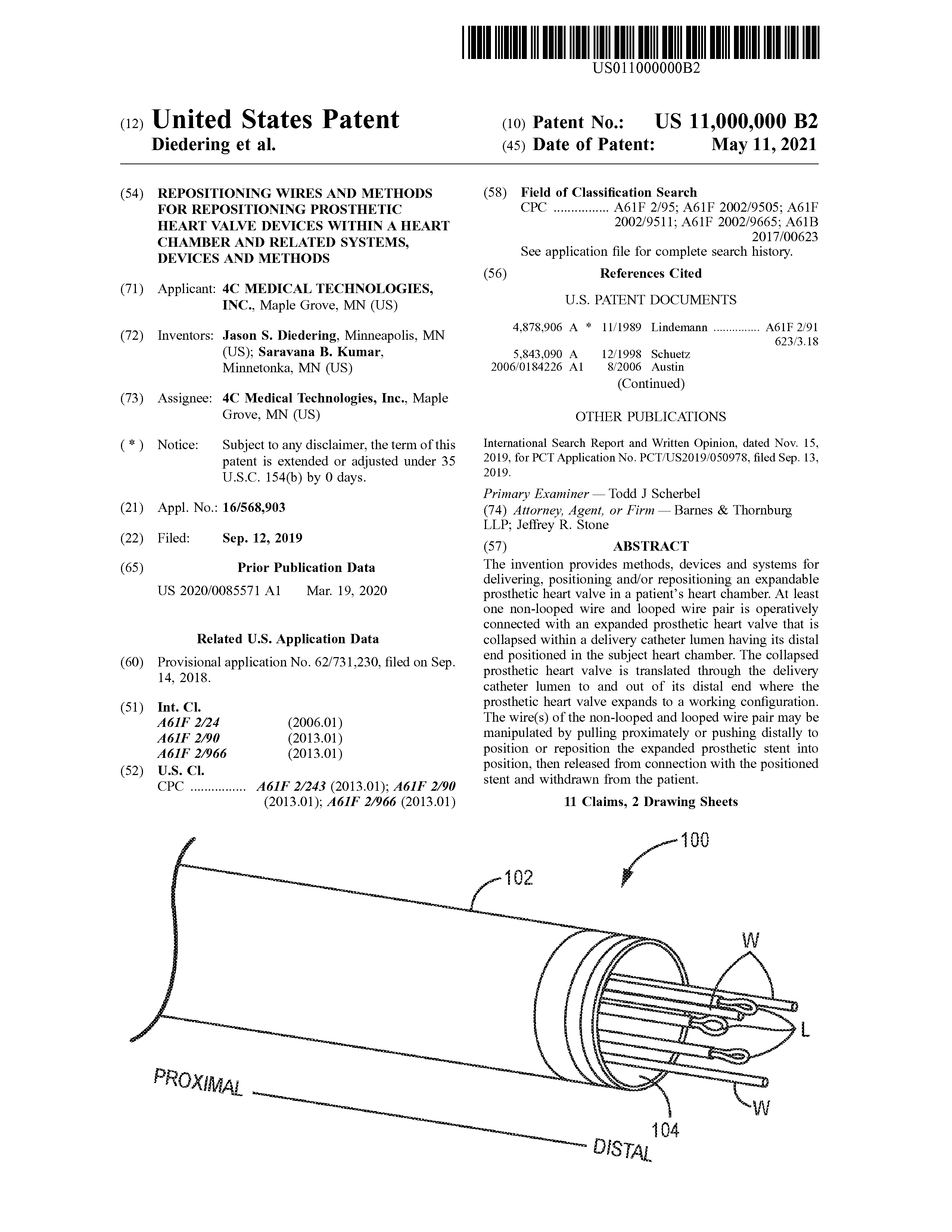
United States Issues Patent Number 11,000,000
WASHINGTON – The United States Patent and Trademark Office (USPTO) today officially issued U.S. patent number 11 million, recognizing an important milestone in American innovation and ingenuity.
“This momentous benchmark is a reminder of the remarkable and enduring tradition of American innovation that has driven our nation forward for generations,” said U.S. Secretary of Commerce Gina Raimondo. “Building our economy back stronger requires new ideas and innovative solutions from every sector. I am proud to recognize patent 11 million, its inventors, and its promise.”
“Since the founding of our nation, American inventors have driven our culture and commerce with incredible ideas that have improved every function of our lives,” said Drew Hirshfeld, performing the functions and duties of the Under Secretary of Commerce for Intellectual Property and Director of the USPTO. “We owe a debt of gratitude to inventors who continue to show up day after day with solutions to the world’s most pressing problems. We congratulate the inventors behind patent 11 million and all of the innovators who helped the country reach this milestone.”
Patent number 11 million, granted to co-inventors Saravana B. Kumar and Jason S. Diedering of 4C Medical Technologies, Inc. in Maple Grove, Minnesota, is for a utility patent that provides a new method for delivering, positioning, and/or repositioning a collapsible and expandable stent frame within a patient’s heart chamber.
“We are incredibly excited and honored to be granted U.S. patent number 11 million for our invention,” said inventor Saravana Kumar. ”The 4C Medical beginning is a true story of American entrepreneurship, where Jason and I worked in a garage many nights and weekends to turn this idea into reality. We could not have gotten here without the support of so many, including my wife Katherine and 4C Medical’s founder, physician Dr. Jeff Chambers. Currently, our team is actively working to demonstrate the benefits of our technology to treat patients with severe mitral regurgitation as part of a U.S. clinical trial.”
“4C Medical’s approach to inventing is simple—we identified a need, created a solution, and demonstrated its benefits. We are a team of highly driven and creative engineers who are committed to bringing lifesaving technologies to people who need it most,” explained inventor Jason Diedering.
Background on the U.S. patent system
Patents predating the Patent Act of 1836 were unnumbered, identifiable only by the name of the patentee and the date of issue. These patents became known as “X-patents” after Patent No. 1 was granted to Senator John Ruggles on July 11, 1836 for a traction wheel for steam locomotives—the first patent issued under the new law, which officially assigned patent numbers. A few months after the Patent Act of 1836 was enacted, a catastrophic fire at the Patent Office destroyed almost all of the records and models related to the X-patents. Efforts to reconstruct the records lost in the fire continue to this day.
Patent 11 million comes three years after the USPTO issued patent number 10 million in 2018. As part of that celebration, the USPTO redesigned the official U.S. patent cover—the seal-and-ribbon document awarded with each patent grant—paying homage to the classic elegance of its predecessors. A list of the patent milestones can be found here.

Kim & Lahey Law Firm Sponsors InnoVision Award for Small Business
The attorneys of the Kim & Lahey Law Firm have been supporting the entrepreneurship community for over 20 years and are happy to continue our support for InnoVision, an award program that recognizes innovation in South Carolina annually. This year, InnoVision received a record number of applications reflecting both the strength of the innovation economy in South Carolina and the special circumstances of the 2020 pandemic.
This year we are sponsoring InnoVision’s Small Enterprise Award, which recognizes a small business for creative technology development or innovative technology application. The technological innovation may be applied to a product, process or service that is intended for sale to customers or for use inside of the organization. To be eligible for this award, the organization must employ fewer than 50 full-time employees or generate less than $20 million in revenue.
InnoVision is hosting a series of Meet the Finalists online get-togethers to announce and congratulate finalists in two award categories each Tuesday at 4:00pm. The Small Enterprise Award finalists will be announced tomorrow, October 13. Please join us through this registration link.
The winners will be announced at the Tuesday, November 17th Awards Ceremony. This year, since it’s an online event, it is open to the public and we will let you know when registration is open.
InnoVision Awards was established in 1999. InnoVision Awards are the mark of distinction for outstanding leadership, innovation, and technological excellence.


